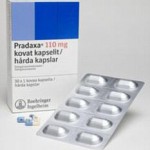April 26, 2012 By Steven Greer, MD
Millions of patients have atrial fibrillation that can lead to blood pooling and  clot formation, which then can migrate to the brain and cause ischemic strokes. For many decades, warfarin has been the only option available to anticoagulate these patients at risk of stroke. However, warfarin (also used as a rat poison) is infamous for being tricky to properly dose and requires frequent blood draws and testing to prevent hemorrhagic stroke or ischemic stroke.
clot formation, which then can migrate to the brain and cause ischemic strokes. For many decades, warfarin has been the only option available to anticoagulate these patients at risk of stroke. However, warfarin (also used as a rat poison) is infamous for being tricky to properly dose and requires frequent blood draws and testing to prevent hemorrhagic stroke or ischemic stroke.
To address this unmet clinical need, and large potential market, the pharmaceutical industry, cardiology community, and certain academic research organizations, such as Harvard’s TIMI and Duke’s DCRI, have helped introduce to the market new oral drugs that promise to replace warfarin.
Pradaxa (dabigatran, made by Boehringer-Ingelheim) and Xarelto (rivaroxaban, co-marketed by Johnson&Johnson, developed and manufactured by Bayer) are currently approved in The U.S. to prevent ischemic stroke and systemic embolism in non-valvular A-fib. Brilinta (ticagrelor, made by AstraZeneca) and Effient (Prasugrel, made by Daichi Sankyo and marketed by Eli Lilly) are on the U.S. market, but are not approved for A-fib stroke prevention. Eliquis (apixaban, being developed by Pfizer and Bristol-Meyers Squibb) is not approved for any indication and is currently under regulatory review.
After more than a year of real-world experience with Pradaxa (approved in October of 2010), and just a few months after the approval of Xarelto to prevent stroke in the A-fib setting, the drugs are not being widely adopted. Total Pradaxa prescriptions in January, 2012, were 76,000, or just 3% of the 2.6 Million warfarin prescriptions.
Why is warfarin still the dominant drug? The bad economy, high unemployment, and fewer people with health insurance, has made costly drugs an unacceptable option for many patients. Pradaxa costs more than $3,000 per year, compared to less than $100 per year for generic warfarin. But safety issues of excessive bleeding are equally concerning.
Patients often need to have their anticoagulation reversed if they are overdosed or need emergency procedures. Warfarin can be reversed with Vitamin K. However, neither Pradaxa nor Xarelto have convenient antidotes and hemodialysis might be required, especially in the setting of life-threatening bleeding.
How can doctors prescribe Pradaxa and Xarelto safely, and which patients should receive the new drugs with uncertain safety profiles? Most cardiologists agree that the patients with small body mass and/or extremes in ages pose too great a risk to try the new drugs. These drugs should be avoided in patients with poor renal function (creatinine clearance less than 15-30 ml/min). Patients taking aspirin and Plavix (clopidogrel) should also be cautioned about increased bleeding risk while also taking Pradaxa or Xarelto.
Regarding the GI bleeding adverse events, many doctors mistakenly believe that upper GI remedies of proton pump inhibitors or other antacids can reduce the risk. In fact, the risk of bleeding is primarily in the lower GI tract where PPIs, etc, have no effect.
Most patients with A-fib undergo attempts to electrically shock (cardiovert) them to normal rhythm. The data are lacking as to how best to use Pradaxa or Xarelto in these patients. Should they be switched to warfarin with the potential increased risk of hemorrhagic stroke that ensues?
With the higher cost, lack of superior efficacy, and increased safety concerns of the new drugs, what type of patient should be attempted therapy with Pradaxa or Xarelto? Patients who are poorly controlled on warfarin; some patients who develop rare but life-threatening side effect of skin necrosis on warfarin; others who are unable or unwilling to go through the blood tests and monitoring required for warfarin might be considered appropriate candidates.
Compounding the real adverse events is the Weber effect. New drugs have a higher reporting rate of adverse events than old familiar drugs, such as warfarin.
As a result of the headwinds against adoption of Pradaxa, Xarelto, and possibly Eliquis, many doctors who study the anticoagulation clinical data for a living are skeptical that the new drugs will make significant gains in market share over warfarin for the next five years.



